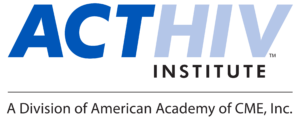Case Studies in Family Planning and Treatment of People with HIV During Pregnancy
|
Release Date: December 28, 2023 |
 |
Support for this activity has been made possible through an |
Educational Need:
Globally, more than 50% of people living with HIV are female. Providing comprehensive care for women and girls with HIV across their lifespan involves counseling on family planning options, including hormonal contraception to prevent unintended pregnancies. Unplanned pregnancies carry a higher burden of adverse outcomes compared to planned pregnancies for both mother and child. In addition, care for women with HIV who desire a pregnancy requires effective antiretroviral therapy options during pregnancy and postpartum, and counseling on infant feeding options. This session will review up-to-date data and guidelines to support contraception, pregnancy, and breastfeeding for women and girls with HIV.
Learning Objectives
- Advise women living with HIV on hormonal contraceptive options based on their current medications and family planning desires.
- Explain the mechanisms of perinatal HIV transmission and interventions to reduce the risks of perinatal HIV transmission.
- Discuss indications for use of intravenous zidovudine and cesarean section for pregnant people with HIV.
- Collaborate with your care team to provide comprehensive family planning for women and girls with HIV across their lifespan
Activity Faculty
|
|
Faculty Bios:
Kimberly Scarsi, PharmD, MS, is a Professor and Vice Chair of the Department of Pharmacy Practice and Science at the University of Nebraska Medical Center (UNMC), with appointments in both the College of Pharmacy and College of Medicine. Dr. Scarsi’s research program focuses on optimizing pharmacologic therapies for persons with HIV, with an emphasis on global health and sex/gender related issues. Her research program is supported by the National Institutes of Health and the AIDS Clinical Trials Group, where she is a scientific member of the Women’s Health Collaborative Science Group. Locally, Dr. Scarsi is a clinical consultant in the UNMC HIV clinic. Nationally she serves as a consultant for the National Institutes of Health COVID treatment guidelines and recently completed a term on the U.S. Department of Health and Human Services (DHHS) Panel on Antiretroviral Guidelines for Adults and Adolescents and the NIH Office of AIDS Research Advisory Council.
William R. Short, MD, MPH, is an Associate Professor of Medicine with a secondary appointment in Obstetrics and Gynecology at the Perelman School of Medicine, University of Pennsylvania in Philadelphia. Dr. Short graduated with his Doctor of Medicine degree from Hahnemann University. Subsequently, he completed an internship, residency, and chief residency in Internal Medicine followed by an Infectious Diseases Fellowship at MCP/Hahnemann University. He has been actively involved in HIV Clinical care and research since 2003. Dr. Short serves as the Associate Director of Penn’s HIV Adult Clinical Trials Unit (ACTU) and the Co-Director of the clinical core of Penn’s Center for AIDS Research (CFAR). He serves as a scientific member of national guideline panels on Treatment of HIV During Pregnancy and Prevention of Perinatal Transmission, Prevention, and Treatment of Opportunistic Infections in adults with HIV, and the HIV Primary Care guidance panel. His research interests include investigations on novel antiretroviral strategies and comorbidities in people with HIV.
Accreditation and Credit Designation

In support of improving patient care, American Academy of CME, Inc. is Jointly accredited by the Accreditation Council for Continuing Medical Education (ACCME), the Accreditation Council for Pharmacy Education (ACPE), and the American Nurses Credentialing Center (ANCC), to provide continuing education for the healthcare team.
Physicians
American Academy of CME, Inc., designates this enduring material for a maximum of 1.00 AMA PRA Category 1 CreditsTM. Physicians should claim only the credit commensurate with the extent of their participation in the activity.
Nurse Practitioners and Nurses
American Academy of CME, Inc., designates this educational activity for 1.0 ANCC contact hours
(0.9 Pharmacotherapeutic Contact Hours).
California
Provider approved by the California Board of Registered Nursing, Provider Number CEP16993 for 1.00 contact hours.
Physician Assistants
American Academy of CME, Inc. has been authorized by the American Academy of PAs (AAPA) to award AAPA Category 1 CME credit for activities planned in accordance with AAPA CME Criteria. This activity is designated for 1.0 AAPA Category 1 CME credits. Approval is valid until December 28, 2024. PAs should only claim credit commensurate with the extent of their participation.
All other members of the care team will receive a certificate of participation.
Target Audience
This activity has been designed to meet the educational needs of the HIV care team, including physicians (both specialists and primary care/family medicine), nurses, nurse practitioners, physician assistants, and pharmacists who are in practice but are newer to HIV medicine or who are in training. Other healthcare providers may also participate.
Disclosure Statement
According to the disclosure policy of the Academy, all faculty, planning committee members, editors, managers and other individuals who are in a position to control content are required to disclose any relationships with any ineligible company(ies). The existence of these relationships is not viewed as implying bias or decreasing the value of the activity. Clinical content has been reviewed for fair balance and scientific objectivity, and all of the relevant financial relationships listed for these individuals have been mitigated.
Disclosure of relevant financial relationships are as follows:
Faculty Educator/Planners
Kimberly Scarsi, PharmD, MS, discloses the following: Grant/Research Support: Organon, ViiV Healthcare
William Short, MD, MPH, discloses the following: Advisory Board/Consultant: Gilead Sciences, ViiV Healthcare; Grant/Research Support: Gilead Sciences; Speakers’ Bureau: Janssen*, ViiV Healthcare*
Planners
John JD Juchniewicz, MCIS, CHCP, FACEHP; Natalie Kirkwood, RN, BSN, JD; Edward Moylan RP; Daiquiri Y. Robinson: No relevant financial relationships to disclose.
ACTHIV® Institute Advisory Board Disclosures:
Roger Bedimo, MD, MS, discloses the following: Advisory Board— ViiV Healthcare, Gilead Sciences, Merck, Theratechnologies, Janssen, Shionogi; Grant/Research Support: Merck, Merck*
Carlos del Rio, MD: No relevant financial relationships to disclose.
Jose Gutierrez, PhD, FNP-BC: No relevant financial relationships to disclose.
H. Nina Kim, MD, MSc, discloses the following: Grant/Research Support—Gilead Sciences
Asa E. Radix, MD, PhD, MPH: No relevant financial relationships to disclose.
William R. Short, MD, MPH, discloses the following: Advisory Board—ViiV, Gilead Sciences; Grant/Research Support—Gilead Sciences; Janssen*
Sarah Smith, MHS, PA-C, AAHIVS, discloses the following: Advisory Board—ViiV, Gilead Sciences, Janssen, Merck; Speaker’s Bureau— ViiV, Gilead Sciences, Janssen, Merck
Susan Weiss, FNP-BC, MSN, discloses the following: Advisory Board—ViiV, ViiV*
*Relationship has ended
This activity reviews off-label or investigational information.
The opinions expressed in this accredited continuing education activity are those of the faculty, and do not represent those of the Academy or its ACTHIV® Institute. This educational activity is intended as a supplement to existing knowledge, published information, and practice guidelines. Learners should appraise the information presented critically, and draw conclusions only after careful consideration of all available scientific information.
Implicit Bias
Implicit bias refers to unconscious attitudes and stereotypes that influence our thoughts, judgements, decisions, and actions without our awareness. Everyone is susceptible to implicit bias, even clinicians. In healthcare, implicit biases can have a significant impact on the quality of care an individual receives. These biases can be both favorable and unfavorable, and are activated involuntarily without an individual’s awareness or intentional control.
Studies have indicated that healthcare providers’ incorrect perceptions can impact providers’ communications and clinical decision-making contributing to disparities in clinical outcomes. Addressing implicit biases in healthcare is critical to improving health outcomes and promoting health equity for all patients. Patient-centered care can reduce the impact of implicit bias, by treating each patient as a unique individual who may or may not hold beliefs associated with their backgrounds and circumstances. In addition, recognizing implicit bias in one’s own practice using techniques such as self-reflection and mindful clinical decision-making can ensure more equitable and effective care to all patients.
Over the past several decades, cognitive science research has demonstrated human behavior, beliefs and attitudes are shaped by automatic and unconscious cognitive processes. The healthcare profession is devoting greater attention to how these automatic and unconscious processes impact care including: (1) preferential treatment toward or against specific patient populations causing healthcare inequities, (2) influence patient-provider communications leading to misunderstandings and mistrust, and (3) impact access to healthcare and affect treatment decisions resulting in misdiagnosis, delays in treatment and specialty referrals and poor pain management.
Considering one might have unconscious biases and exploring them may be uncomfortable because the very idea that they exist may conflict with how clinicians perceive themselves. It is only by becoming aware of one’s unconscious biases that members of the healthcare team can take steps to mitigate them to ensure all their patients are treated receive quality healthcare.
Instructions on How to Receive Credit
There are no fees to participate in the activity. Participants must review the activity information including the learning objectives and disclosure statements, as well as the content of the activity. To receive CME/CE credit for your participation, please complete the post-assessment and program evaluation. Your certificate will be available for printing immediately.
Privacy and Contact
For more information about the American Academy of CME privacy policy, please access http://www.academycme.org/privacy.htm For any questions, please contact: [email protected].
Hardware/Software Requirements
This program should be viewed at a resolution of 1024 x 768 or higher using current versions of Microsoft Internet Explorer, Firefox, Chrome or Safari. A high-speed Internet connection is recommended.
Copyright
© 2023. This accredited continuing education activity is held as copyrighted © by American Academy of CME. Through this notice, the Academy grants permission of its use for educational purposes only. These materials may not be used, in whole or in part, for any commercial purposes without prior permission in writing from the copyright owner(s).


